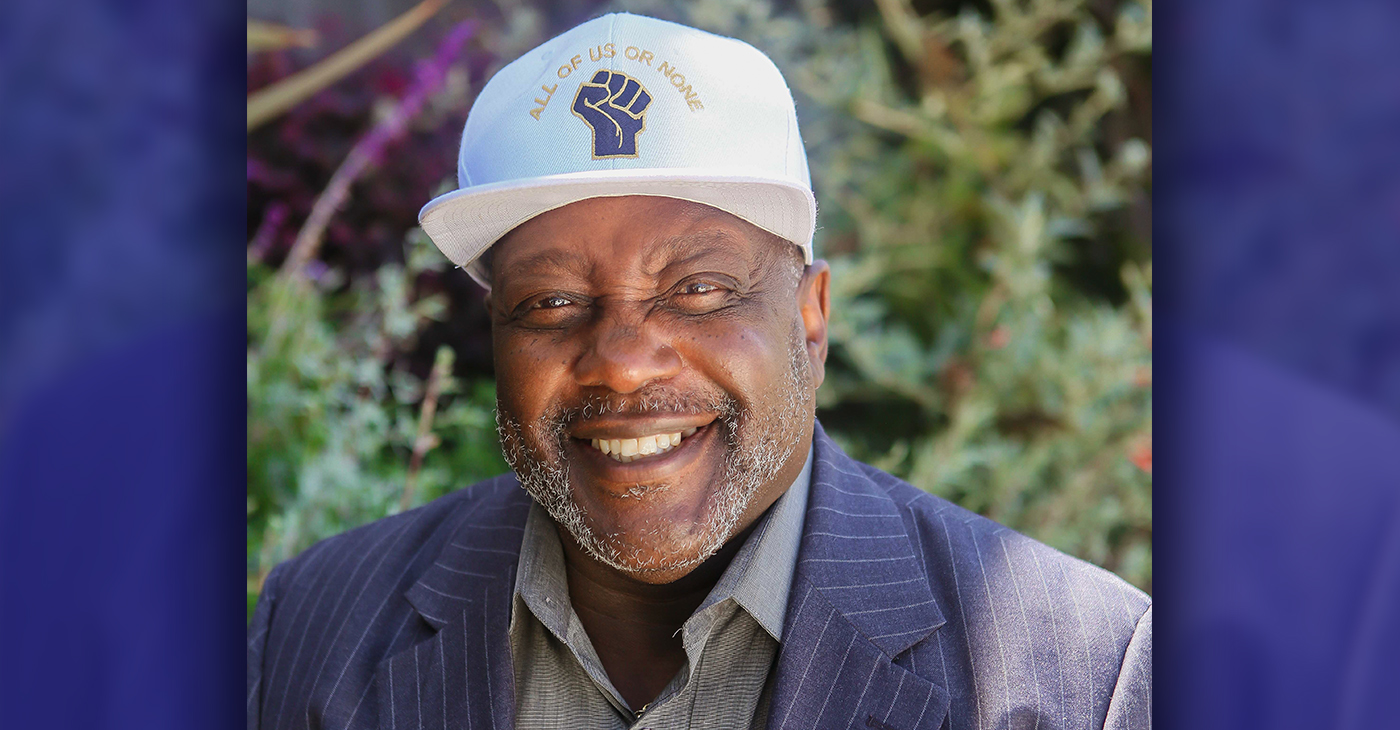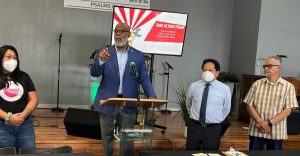Activism
OPINION: Juneteenth is a Chance for Faith Leaders to Address Modern Slavery
the prohibition of slavery in the 13th Amendment of the U.S. Constitution and the 1st Amendment of the California Constitution have exceptions with regards to people duly convicted of crimes. People continue to be subjected to involuntary servitude in California and are as invisible as the enslaved people met by Union General Gordon Granger in 1865. I question the moral implications of the state and federal governments’ ongoing practice of slavery; it is one thing to punish and another to be entitled to enslave.

By Dorsey Nunn
I hope this letter finds you in the loving embrace and grace of the God of your understanding. I am writing you as a former slave of the State of California. As Juneteenth approaches, I thought I would reach out to you in hopes of influencing and inspiring faith leaders to speak to their congregations about the issue of current day slavery on the week of June 12. Juneteenth has been adopted as a federal holiday—one that has been celebrated in the African American community since 1865. On June 19, 1865, in Galveston, Texas, the Union soldiers arrived, led by General Gordon Granger. They freed enslaved people that had been held in bondage almost two years after the Jan. 1, 1863 signing of the Emancipation Proclamation.
Despite this alleged freedom, the prohibition of slavery in the 13th Amendment of the U.S. Constitution and the 1st Amendment of the California Constitution have exceptions with regards to people duly convicted of crimes. People continue to be subjected to involuntary servitude in California and are as invisible as the enslaved people met by Union General Gordon Granger in 1865. I question the moral implications of the state and federal governments’ ongoing practice of slavery; it is one thing to punish and another to be entitled to enslave.
A couple of weeks ago while sitting in a church listening to a minister preach about Moses, I wondered why current enslavement was invisible. Why can’t people see current day slavery? Why can’t they see people being forced to work on the side of freeways as current day slaves? Why can’t they see people being forced to work in parks, shoring up levees in the valley, fighting forest fires and countless other jobs extracted through threats and punishment by the state as current day slaves? Moreover, why can’t they see people being rented out to corporations by the state and traded on the stock exchange as current day slaves? I do not believe people can volunteer at gunpoint or while imprisoned. I wonder if Moses showed up today if we could really see him or his enslaved parents.
The narrative associated with right and wrong is so potent that it renders people indifferent. People assume because it is legal, it must be just and it must be right. History has more than enough examples where laws were proven to be unjust over the course of time. Chattel slavery is just one of those examples.
If Assembly Constitution Amendment 3 passes in the California Senate, the issue of whether prisoners should be enslaved will be put on the California ballot for a vote. If it is put on the ballot for a vote, it will be the first time in multiple generations that the California electorate will have the opportunity to vote on anything regarding slavery. I believe faith leaders will get a chance to ask themselves and their congregations, “What would Moses do if given an opportunity to vote on the issue of slavery?”
Ultimately, if the historic ACA3 winds up on the ballot, I want to offer my formerly incarcerated staff and All of Us or None members to speak or lead discussions on this most important political and moral issue. People could see my incarceration, but they still have not caught up with the notion of my enslavement.
Activism
Asm. Corey Jackson Proposes Safe Parking for Homeless College Students Sleeping in Cars
Assemblymember Corey Jackson (D-Moreno Valley), a member of the California Legislative Black Caucus (CLBC), is the author of AB 90, which would require community colleges and California State University campuses to create overnight parking programs where students can sleep safely in their vehicles. With one in four community college students in California experiencing homelessness in the past year, Jackson says the state must act urgently.

By Bo Tefu
California Black Media
As California’s housing crisis continues to impact students, new legislation, Assembly Bill (AB) 90, promises to allow college students without stable housing to sleep in their cars on campus, offering a stark but practical solution aimed at immediate relief.
Assemblymember Corey Jackson (D-Moreno Valley), a member of the California Legislative Black Caucus (CLBC), is the author of AB 90, which would require community colleges and California State University campuses to create overnight parking programs where students can sleep safely in their vehicles. With one in four community college students in California experiencing homelessness in the past year, Jackson says the state must act urgently.
“This just deals with the harsh realities that we find ourselves in,” he said at a recent hearing.
The bill passed its first committee vote and is gaining attention as housing affordability remains a top concern across the state. California rents are more than 30% above the national average, and long waitlists for student housing have left thousands in limbo. CSU reported more than 4,000 students on its housing waitlist last year.
Supporters stress that the bill is not a long-term solution, but a humane step toward helping students who have no other place to go. A successful pilot program at Long Beach City College has already shown that safe, supervised overnight parking can work, giving students access to restrooms, Wi-Fi, and a secure environment.
However, the CSU and community college systems oppose the bill, citing funding concerns. Critics also worry about safety and oversight. But Jackson and student advocates argue the crisis demands bold action.
“If we know students are already sleeping in their cars, why not help them do it safely?” said Ivan Hernandez, president of the Student Senate for California Community Colleges.
Activism
Newsom Fights Back as AmeriCorps Shutdown Threatens Vital Services in Black Communities
“When wildfires devastated L.A. earlier this year, it was AmeriCorps members out there helping families recover,” Gov. Newsom said when he announced the lawsuit on April 17. “And now the federal government wants to pull the plug? We’re not having it.”

By Bo Tefu
California Black Media
Gov. Gavin Newsom is suing the federal government over its decision to dismantle AmeriCorps, a move that puts essential frontline services in Black and Brown communities across California at risk, the Governor’s office said.
From tutoring students and mentoring foster youth to disaster recovery and community rebuilding, AmeriCorps has been a backbone of support for many communities across California.
“When wildfires devastated L.A. earlier this year, it was AmeriCorps members out there helping families recover,” Newsom said when he announced the lawsuit on April 17. “And now the federal government wants to pull the plug? We’re not having it.”
The Department of Government Efficiency (DOGE) under the Trump administration is behind the rollback, which Newsom calls “a middle finger to volunteers.”
Meanwhile, Newsom’s office announced that the state is expanding the California Service Corps, the nation’s largest state-run service program.
AmeriCorps has provided pathways for thousands of young people to gain job experience, give back, and uplift underserved neighborhoods. Last year alone, over 6,000 members across the state logged 4.4 million hours, tutoring more than 73,000 students, planting trees, supporting foster youth, and helping fire-impacted families.
The California Service Corps includes four paid branches: the #CaliforniansForAll College Corps, Youth Service Corps, California Climate Action Corps, and AmeriCorps California. Together, they’re larger than the Peace Corps and are working on everything from academic recovery to climate justice.
“DOGE’s actions aren’t about making government work better. They are about making communities weaker,” said GO-Serve Director Josh Fryday.
“These actions will dismantle vital lifelines in communities across California. AmeriCorps members are out in the field teaching children to read, supporting seniors and helping families recover after disasters. AmeriCorps is not bureaucracy; it’s boots on the ground,” he said.
Activism
Four Bills Focus on Financial Compensation for Descendants of Enslaved People
This week, CBM examines four more bills in the package — each offering ways for Black Californians to receive restitution for past injustices — from housing assistance and reclamation of loss property to fairer pay and the establishment of a state agency charged with determining eligibility for reparations.

Edward Henderson
California Black Media
Last week, California Black Media (CBM) provided an update on four bills in the California Legislative Black Caucus (CLBC) 2025 Road to Repair package.
The 16 bills in the Black Caucus’s 2025 “Road to Repair” package focus on “repairing the generational harms caused by the cruel treatment of African American slaves in the United States and decades of systemic deprivation and injustice inflicted upon Black Californians,” said the CLBC in a release.
This week, CBM examines four more bills in the package — each offering ways for Black Californians to receive restitution for past injustices — from housing assistance and reclamation of lost property to fairer pay and the establishment of a state agency charged with determining eligibility for reparations.
Here are summaries of these bills, information about their authors, and updates on how far each one has advanced in the legislative process.
Assembly Bill (AB) 57
AB 57, introduced by Assemblymember Tina McKinnor (D-Inglewood), would require that at least 10% of the monies in the state’s home purchase assistance fund be made available to applicants who meet the requirements for a loan under the home purchase assistance program and are descendants of formerly enslaved people.
The Assembly Judiciary Committee is currently reviewing the legislation.
Assembly Bill (AB) 62
AB 62, also introduced by McKinnor, would require the Office of Legal Affairs to review, investigate, and make specific determinations regarding applications from people who claim they are the dispossessed owners of property seized from them because of racially motivated eminent domain. The bill would define “racially motivated eminent domain” to mean when the state acquires private property for public use and does not provide just compensation to the owner, due in whole or in part, to the owner’s race.
AB 62 is currently under review in the Judiciary Committee.
Senate Bill (SB) 464
SB 464, introduced by Sen. Lola Smallwood-Cuevas (D-Los Angeles), aims to strengthen the existing civil rights laws in California concerning employer pay data reporting. The bill mandates that private employers with 100 or more employees submit annual pay data reports to the Civil Rights Department. These reports must include detailed demographic information — including race, ethnicity, sex, and sexual orientation — pertaining to their workforce distribution and compensation across different job categories. Furthermore, beginning in 2027, public employers will also be required to comply with these reporting requirements.
The Senate Committee on Labor, Public Employment, and Rules is currently reviewing SB 464. A hearing is expected to be held on April 23.
Senate Bill (SB) 518
SB 518, introduced by Sen. Akilah Weber Pierson (D-San Diego), establishes the Bureau for Descendants of American Slavery to address and remedy the lasting harms of slavery and the Jim Crow laws suffered by Black Californians.
SB 518 is under review in the Senate Judiciary Committee. A hearing is expected to be held on April 22.
-

 Activism4 weeks ago
Activism4 weeks agoOakland Post Endorses Barbara Lee
-

 Activism3 weeks ago
Activism3 weeks agoOakland Post: Week of April 2 – 8, 2025
-

 #NNPA BlackPress3 weeks ago
#NNPA BlackPress3 weeks agoTrump Profits, Black America Pays the Price
-

 Activism2 weeks ago
Activism2 weeks agoOakland Post: Week of April 9 – 15, 2025
-

 #NNPA BlackPress3 weeks ago
#NNPA BlackPress3 weeks agoHarriet Tubman Scrubbed; DEI Dismantled
-

 #NNPA BlackPress3 weeks ago
#NNPA BlackPress3 weeks agoTrump Targets a Slavery Removal from the National Museum of African-American History and Culture
-

 #NNPA BlackPress3 weeks ago
#NNPA BlackPress3 weeks agoLawmakers Greenlight Reparations Study for Descendants of Enslaved Marylanders
-

 #NNPA BlackPress3 weeks ago
#NNPA BlackPress3 weeks agoNew York Stands Firm Against Trump Administration’s Order to Abandon Diversity in Schools






















































